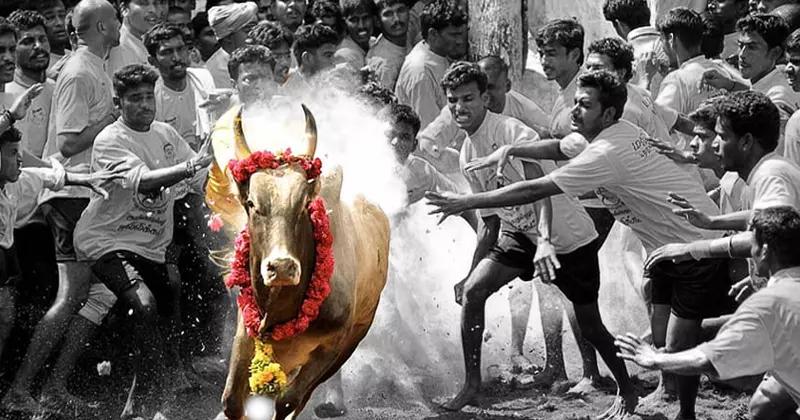The animal rights organisation People for Ethical Treatment of Animals (PETA) has moved the Supreme Court to seek a review of the Constitution Bench’s decision to uphold the validity of the Tamil Nadu, Karnataka and Maharashtra’s state amendments to the Prevention of Cruelty to Animals Act (PCA Act), 1960, introduced to regulate the conduct of Jallikattu, Kambala and Bullock Cart Race.
PETA argues that these bovine sports involve the exploitation of animals through violence, force, agitation and coercion. “These ‘sports’ are against the natural instinct, behaviour and anatomy of the bulls/bullocks/buffaloes, serve no essential purpose, and cause untold suffering, pain and cruelty to the animals used for such ‘sports’,” the animal rights organisation submitted.
PETA further submitted that these sports lead to frequent incidents of severe injuries and fatalities, affecting animals and humans. “The Judgement is a retrograde step which undoes dynamic and beneficial constitutional interpretation and contradicts established environmental law and animal welfare jurisprudence,” PETA contended.
On May 18, the Constitution Bench, comprising Justices KM Joseph, Ajay Rastogi, Aniruddha Bose, Hrishikesh Roy, and CT Ravikumar, overruled the two-judge bench’s decision in the Animal Welfare Board of India v A Nagaraja (2014) case, wherein the Division Bench of the Supreme Court held that Jallikattu was not a part of Tamil Nadu’s cultural heritage, noting that the Division Bench arrived at the conclusion based on insufficient evidence.
The Constitution Bench further acknowledged that the bovine sport was going on for “at least last few centuries,” and said, “When legislature has declared that jallikettu is part of cultural heritage of TN state, judiciary cannot take a different view. Legislature is best suited to decide that.” The court further said, “We will not disrupt the view of the legislature that it is part of the cultural heritage of the state,” noting that that preamble of Tamil Nadu’s amendment refers to Jallikattu as a part of state’s cultural heritage.”
The Constitution Bench was hearing a petition challenging the three state amendments regulating the conduct of bovine sports which are a part of these state’s cultural heritage. The petitioners contended that the impugned amendments contravene the Division Bench’s verdict in the A Nagaraja case, as they do not cure the ‘defects’ brought out in the judgement. The petitioners further argued that the amendments were ‘colourable legislations’ introduced to override the judicial verdict.
However, the Constitution Bench rejected the petitioner’s contentions and observed that there is a substantial change in the manner Jallikattu and other bovine sports are performed after the state amendments were enacted. The court further observed that the ruling in the A Nagaraja case was based on factual circumstances, it cannot be said that the ruling is applicable to the present situation, as the nature and manner in which the bovine sports were performed have been altered.
Furthermore, the Constitution Bench noted that Tamil Nadu’s state amendment relates to, in pith and substance, Entry 17 of the List III (Concurrent List) of the Seventh Schedule to the Constitution of India, and is not a colourable legislation. The court also noted that the amendment minimises cruelty to the participating animals due to the implementation of the amendment act, along with its rules and notifications, and thus the act does not contravene the PCA Act.
The Battle for Tamil Culture: A Timeline
In 2006, the single judge of the Madras High Court, Justice R Banumathi, banned Jallikattu, Rekla Race and other sports, causing ‘cruelty’ to animals in view of the PCA Act. Ever since the bovine sport was first banned, it has faced multiple back and forth with the law.
In 2009, the Tamil Nadu government decided to preserve Jallikattu, a part of Tamil cultural heritage, and therefore, introduced the TNRJ Act to regulate the conduct of the bovine sport. However, the legislation was challenged shortly after.
In 2011, Jairam Ramesh released a notification listing six animals – bears, monkeys, tigers, panthers, lions and bulls – that shall not be exhibited or trained as ‘performing animals’ with immediate effect, thus, banning the cultural sport of Jallikattu. However, the bovine sport continued to be held in Tamil Nadu due to TNRJ Act.
In 2014, the MoEF’s AWBI and People for the Ethical Treatment of Animals (PETA), an animal rights NGO, moved the Supreme Court seeking a ban on Jallikattu, Bullock Cart Race and other bovine sports, armed with the UPA government’s 2011 notification excluding ‘bulls’ from the list of performing animals.
Thereafter, the Division Bench ruled in favour of the petitioners in A. Nagaraja case, imposing a pan-India ban on Jallikattu, Bullock Cart Race and other bovine sports, placing reliance on the AWBI’s evidence. The court struck down the TNRJ Act, which allowed and regulated the conduct of Jallikattu in Tamil Nadu, stating that it was violative of the PCA Act and the Constitution of India.
“I welcome the Supreme Court judgement. It will put an end to a barbaric practice” – Congress leader Jairam Ramesh on Supreme Court’s ban on Jallikattu
The Tamil Nadu government sought a review of the Division Bench’s verdict contending that the sport is not cruel as a whole and the instances of cruelty are isolated incidents. However, the court rejected the state government’s plea.
In 2015, former Prime Minister Manmohan Singh wrote a letter to Humane Society International/India (HSII), an organisation similar to PETA, deprecating Jallikattu. He wrote, “We have to work to discourage bullfights which provide a cruel form of entertainment. I wish you all success in achieving your objective,” in his letter to HSII Managing Director NG Jayasimha.
In 2016, the NDA government’s Ministry of Environment, Forest and Climate Change (MoEF&CC) released a notification, which amended the UPA government’s 2011 notification. The MoEF&CC’s notification inserted a proviso permitting the conduct of the Jallikattu and Bullock Cart Race “in the manner by the customs of any community or practiced traditionally under the customs or as a part of culture.”
The 2016 notification also listed certain conditions regulating the track’s conditions, ensuring the physical health of participating bulls and prohibition on the use of performance-enhancing drugs. However, the Supreme Court stayed the NDA government’s notification after AWBI, PETA and other animal rights bodies moved the court against it.
In 2017, the state of Tamil Nadu witnessed mass protests with protestors raising “Save Jallikattu” placards and banners. Thereafter, Tamil Nadu introduced a state amendment to the PCA Act in order to preserve the Tamil cultural heritage. Furthermore, the then-President of India Pranab Mukherjee gave his assent to the state amendment, giving it effect.
Maharashtra and Karnataka also introduced similar amendments to preserve their culture. However, PETA and other animal rights bodies challenged the three state amendments before the Supreme Court, contending that it contravened with the Division Bench’s verdict in the A. Nagaraja case.
It is pertinent to note that Congress spokesperson and Senior Advocate Abhishek Manu Singhvi appeared on behalf of the petitioners challenging the state amendments and seeking a ban on Jallikattu. However, when asked to choose between the case and his Rajya Sabha membership, the Congress leader decided to withdraw from the case in 2017.
In 2018, the two-judge bench of the Supreme Court referred the case to a five-judge bench as it involved substantial questions pertaining to the interpretation of the Constitution of India.
In 2019, Jayanthi Natarajan, former Union Minister in the UPA government, admitted that Jairam Ramesh and Congress were responsible for banning the Tamil cultural sport in an interview with a Tamil news channel.
In 2021, Congress reversed its anti-Jallikattu stance when Congress leader and Gandhi scion Rahul Gandhi visited Madurai as a special guest at a Jallikattu event, a few months before the sixteenth Tamil Nadu assembly elections.
He said, “I will always stand with the Tamil people to protect their culture and Tamil language,” at the event, whitewashing the Congress’s persistent efforts seeking a ban on Jallikattu. “I have come here specifically to give a message to those who think that they can run a roughshod over the Tamil people and push aside their culture. The Tamil people, their culture and heritage are very important for the future of India,” he added.
It is pertinent to note that in 2016, the Congress released its manifesto promising a ban on Jallikattu for the 2016 Tamil Nadu assembly elections. However, the UPA lost the election. Furthermore, in January 2021, the Tamil Nadu Congress Committee tweeted a forged version of its 2016 manifesto before the 2021 assembly elections claiming that it had promised to “revoke the ban on Jallikattu” during the 2016 elections.
In 2022, the Constitution Bench reserved its verdict in the case concerning the challenge to Tamil Nadu, Maharashtra and Karnataka’s state amendments allowing the conduct of the Jallikattu, Kambala and Bullock Cart Race. Thereafter, the court overruled its decision in the A Nagaraja case and upheld the three state amendments, preserving the cultural heritage of the states.



















Comments